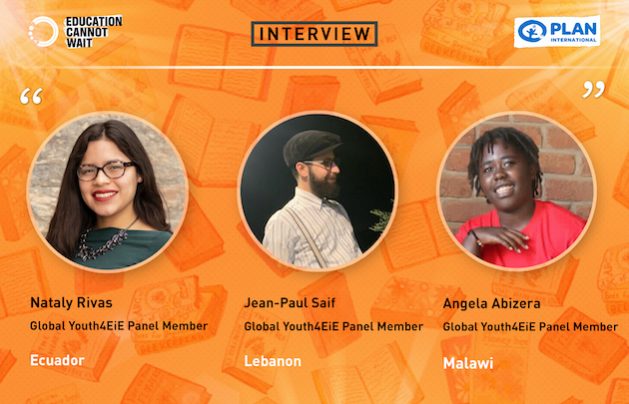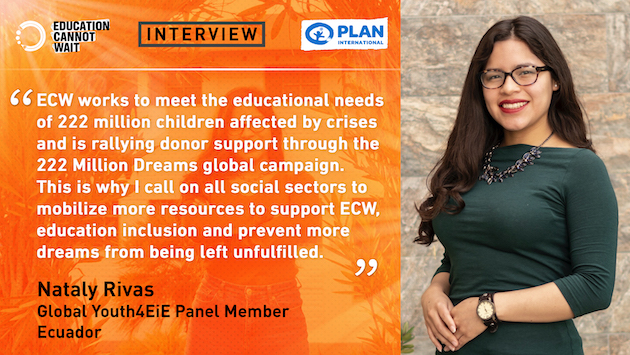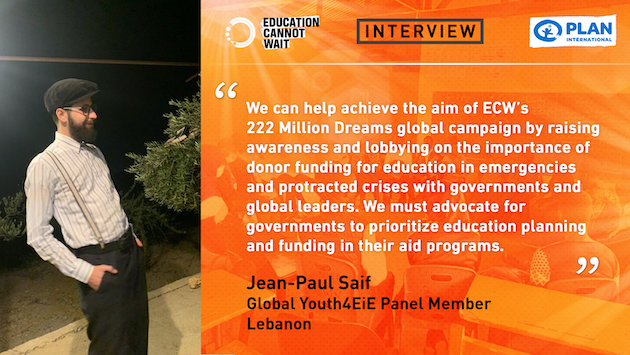Advocates
ECW Interviews Three Inspiring #Youth4EiE Advocates on International Youth Day
August 12, 2022 (Global News Distribution) -
Three inspiring #Youth4EiE Advocates – Nataly Rivas, Angela Abizera, and Jean-Paul Saif. Nataly, Angela, and Jean-Paul are three Global Youth for Education in Emergencies panel members. Credit: ECW

Ecuador, Malawi, Lebanon, Aug 12 2022 (IPS) – On this International Youth Day, ECW interviewed three inspiring #Youth4EiE Advocates – Nataly Rivas, Angela Abizera, and Jean-Paul Saif. Nataly, Angela, and Jean-Paul are three Global Youth for Education in Emergencies panel members.
The (#Youth4EiE) panel brings together youth leaders from across eight countries to work together to put education in emergencies and protracted crises on top of the agenda for world leaders. The #Youth4EiE initiative is made possible through ECW’s partnership with Plan International UK and is supported by the People’s Postcode Lottery.
The #Youth4EiE panel is composed of 16 members representing Ecuador, Indonesia, Lebanon, Malawi, Mali, Zimbabwe, the United States, and the United Kingdom. Each member is a positive force for change in their own communities. They combine their skills, networks, and expertise to help raise awareness of the challenges which crisis-affected girls and boys face in accessing education in emergencies and protracted crises while advocating for increased funding from donors in support of ECW’s #222MillionDreams campaign.

Nataly Rivas, 21, Ecuador
Nataly Rivas is a Sociology and International Relations student from Pichincha, Ecuador. She is an active leader and National Communications Coordinator in the “Por Ser Niña” movement, an Ecuador U-reporter, and a Global #Youth4EiE Panel Member – where she represents Ecuador. Since she was eleven, Nataly has participated in Plan International Ecuador projects, which have shown her the situations of inequality in her country and provoked in her a desire to fight to change that reality. She is passionate about girls’ rights and currently helps manage the “Por Ser Niña” movement’s social media – a civil society group of girls, boys, and young people in Ecuador whose objective is gender equality.
ECW: What does education mean to you? And how can we help realize #222MillionDreams for the 222 Million crisis-impacted children and adolescents who urgently need education support?
Nataly: I always say that education is a tool that can save lives, especially for girls and women. It can help prevent gender-based violence as it offers us better opportunities for the future. In a nutshell, education makes it possible to move closer to gender equality. However, in emergency situations, education is not prioritized – even financial resources are subtracted, causing millions of children to see their education and dreams interrupted or ended. We must urgently continue to fight for education so that educational institutions become safe environments with quality education available to everyone, especially in emergency situations. ECW works to meet the educational needs of 222 million children affected by crises and is rallying donor support through the #222MillionDreams campaign. This is why I call on all social sectors to mobilize more resources to support ECW, education inclusion and prevent more dreams from being left unfulfilled. Let us remember that, with education, we all win, and therefore, we must fight for it, make our demands and invest in it so that it is guaranteed for all.
ECW: In Ecuador, ECW, UN agencies, and civil society partners in coordination with the Ministry of Education have built an amazing campaign, La Educación es el Camino (Education is the Way), to make education a priority for everyone, especially children fleeing the crisis in Venezuela. How can we build a better world where refugee children are able to access safe and protective learning environments? And why is it important for the people of Ecuador?
Nataly: To build a better world for refugee children, essential rights such as the right to a dignified life, a nutritious diet, equality, and access to quality education must be guaranteed. Through education, other rights can be forged, so it is essential that education inclusion is guaranteed in schools where refugee children can feel safe and have better opportunities to develop. These spaces must be free of violence and xenophobia. And we can achieve this through fostering a culture of good treatment of others in the family, educational, and community environments. It is also important that assistance and aid programs are generated for families because one of the main barriers for girls and boys to have a quality life, and access to education is economic scarcity. The whole of society can and must contribute to the construction of a better world – not only for refugees but for everyone. Caring about and fighting collectively for sustainable solutions benefits us all and prevents further deepening levels of inequality in our country.
ECW: How can we activate science, technology, engineering, and math studies for girls and boys in crises to activate social entrepreneurship and provide a pathway out of poverty?
Nataly: Governments need to invest in scholarships for girls and boys to study and finance their projects and ideas. We need an education where students are the leaders of innovation and motivation. For these reasons, society should encourage children to study scientific careers, and adults must ensure more and better opportunities for the new generations and put aside adult centrism. Additionally, work must be done to eliminate the global digital divide and eradicate prejudices and stereotypes that disproportionately punish girls and women.

Angela Abizera, 23, Malawi
Angela Abizera is a girls’ rights and education activist from Malawi. She is a mentor in the Child Parliament, a poet, and a Global #Youth4EiE Panel Member – representing Malawi. Angela is originally from Rwanda but was raised in the Dzaleka Refugee Camp in Malawi. She has lived there for over 16 years and managed to complete her education at the camp. Since completing her schooling, she has been engaged in community work because she believes in giving back. Through these service efforts across different platforms, she has been able to advocate on various issues concerning the rights of children and young people, particularly girls.
Angela: Education is a basic need and right of every child in the world. There is an urgent need to allocate more funds for education in emergencies and protracted crises (EiEPC). During crises, education is not prioritized – though it is often affected and disrupted. ECW’s #222MillionDreams campaign is a call to action: we must all do our part, including donors, to help these crisis-affected children and youth continue their education. As a young leader, I call on world leaders to urgently consider EiEPC and support ECW’s global campaign to help realize the dreams of millions of vulnerable girls and boys! We must work to establish coordination structures in education to immediately address challenges faced during and after emergencies, ensuring that learning does not stop. Additionally, we should ensure that safe, protective spaces are inclusive and provide support to all – especially those most vulnerable and affected, such as children living with disabilities, teen mothers who fail to go back to school due to stigma, and other minority groups. There is also a need to review laws that affect refugee children who, at times, face restrictions in their countries of asylum that can shatter their hopes of continuing their education. Such policies must be revised, and the needs of young refugees must be prioritized in EiEPC budgeting.
Angela: We cannot deny the fact that climate change is continuously affecting the world and disrupting education systems. Recently, Malawi was affected by Cyclone Ana which damaged a lot of infrastructure – causing people to flee their homes and shelter in classrooms, temporarily disrupting classes. Climate change should be integrated into the school syllabus because we need young people to be aware of the climate and environment around them. This would help sensitize and teach preparatory skills that they can use during emergencies. Learning about climate change and how to combat it empowers young people to make informed decisions and take action. Additionally, introducing disaster risk reduction clubs in schools can help build the capacity of innovative/creative youth, encouraging them to explore new skills to help spread this crucial information beyond the school to help foster more responsible communities. Lastly, governments should consider building resilient structures that can withstand any calamities.
ECW: You are a poet. Have you written anything about the power of an education? Could you share it with us?
LISTEN by Angela Abizera
(excerpts from her poem below)
Listen!
Don’t just listen but act!
As we speak we lose what we lose, but we spread the fact
Do what you intend to do but make sure you keep me intact,
with education
Listen,
With education
I am not just a girl child
I am a woman with a voice
A voice that speaks, a need that seeks
I am the world’s empowerment,
The world’s champion of change!
Listen,
I don’t want
These pauses in between
The disruptions over and over
I want my education not to cease
Transforming the world to goodness
We are the equality of highest quality
We are exclusively inclusive
We are Education!

Jean-Paul Saif, 23, Lebanon
Jean-Paul Saif is an electronics student, entrepreneur, and Global #Youth4EiE Panel Member, representing Lebanon. Jean-Paul was born and currently lives in Zahle, Lebanon, where he has set up a plastic recycling factory. He is a leader in the Scouts movement, where he supports young people to share his love of hiking and camping. He is also a stand-up comedian and theater actor.
ECW: What does education mean to you? And how can we help realize #222MillionDreams for the millions of crisis-impacted children and adolescents who need educational support?
Jean-Paul: Education means everything to me because education is the start of everything. Your journey of learning begins at school, goes through university, and also continues outside of these places – at work, with family, and within your daily life. Education is important because it empowers you and it sets you up for success in life. Without a proper education, you cannot get a proper job or adequate salary. We can help achieve the aim of ECW’s #222MillionDreams campaign by raising awareness and lobbying on the importance of donor funding for education in emergencies and protracted crises with governments and global leaders. We must advocate for governments to prioritize education planning and funding in their aid programs. In crisis-affected countries, we should build schools in remote, hard-to-access areas where they’re currently unavailable. I also believe in continuing our push for peace and to end wars and attacks on schools that happen during conflict. Finally, in countries that are more prone to natural disasters such as earthquakes, we should support the creation of stronger infrastructure.
ECW: Lebanon has faced several shocks over the past decade, including the refugee influx from Syria, the 2020 Beirut port blast, the economic crisis, and the COVID-19 pandemic. How can education help us build back better?
Jean-Paul: I believe the most impactful starting point is to adapt and include civic education and active citizenship courses in schools that are free from religious and political affiliation – and support students to learn about active citizenship and not blindly follow leaders from a young age. Additionally, orienting students to the right professions early on, including ones that will be needed in the future, to create a new wave of graduates equipped with the skills necessary for the next generation would help support building back better in Lebanon. Finally, opening and expanding educational opportunities, such as trainings in social media, would also support entrepreneurship and job creation in the country.
ECW: How can we activate science, technology, engineering, and math studies for girls and boys in crisis-impacted contexts like Lebanon, Syria, and beyond to activate social entrepreneurship and provide a pathway out of poverty?
Jean-Paul: Teaching kids about the newest technology can help them improve their knowledge about what the world is going through as almost everything is becoming digital. Children will have access to the largest field of opportunities to choose from and to learn by using the internet. For example, there are various websites that teach about coding and creating different kinds of artificial intelligence. Through these websites and online resources, children can start by learning things like building small devices and, in the long term, develop skills to help companies with larger projects.
Latest News
- Accommodations
- Accounting
- Advertisement
- Advertising
- Agriculture
- Agriculture & Agribusiness
- AI in Agriculture
- Apparel & Accessories
- Artificial intelligence
- Auto
- Banking
- Beauty & Cosmetics
- Biometrics
- Biotechnology
- Blog
- Books
- Business
- Business Services
- Communications
- Construction
- Consulting
- Consumer Products
- Cosmetic Surgery
- Cosmetics & Fashion
- Crypto
- Cryptocurrency & Blockchain
- Culture
- Design
- eCommerce
- Education
- Electronics
- Employment
- Energy
- entertainment
- environment
- Events
- Farming
- Fashion
- Film and Entertainment
- financial
- Financial Services
- Financials
- Fine Arts
- food
- Food & Beverage
- Gardening
- General
- Global Innovation
- Green Technology
- Grid
- Health
- Health Care
- Identity Verification
- Immigration Security
- Information
- Information Technology
- Insurance
- Journalism & News
- Legal
- Legal Services
- Lifestyle
- Manufacturing
- Media
- Media & Broadcasting
- Medical
- Medical Devices & Supplies
- Mortgage
- Motion Pictures & Video
- Motivation
- Music
- national
- New Releases
- News
- Non-profit
- Opportunities
- Pharmaceutical
- Politics
- Public Administration
- Public Relation
- Publishing
- Real Estate
- Religion
- Research Services
- Resources
- Retail
- SECURITY
- services
- Shipping
- Social Development
- Social Responsibility
- Softwares
- sports
- Steel
- Tech
- technology
- Technology Innovations
- Telecommunication Services
- Telecommunications
- Tourism
- Trading
- Transportation
- traveling
- Uncategorized
- Utilities
- Video Game
- Web Design & Development
- Web Services





